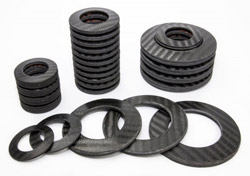
Posted to News on 8th Mar 2016, 06:38
Carbon Composite Bellows Springs provide compressive tunability
Abssac is promoting the capabilities offered by Carbon Composite Bellows Springs (CCBS). Similar in design to Belleville washers, carbon fibre disc springs can be used in stacked arrangements to take advantage of the high-tensile properties of carbon composites when they are loaded in bending.

Offering a new solution to old problems, carbon fibre composites provide significant advantages compared with conventional metallic alloys when used as a compressive spring material. Manufacturing using a moulding technique allows for complicated and intricate designs to be formed in a single operation, and also enables design features to be created that are not possible with a machined or stamped metallic parts.
By orientating multiple individual carbon fibre elements, typically paired in sets and then stacked, a carbon fibre compression spring can be configured. The spring rate of the stack is determined by the number of elements, the base spring rate of each element, and their orientation (series or parallel) within the stack.
Furthermore, the laminate construction also permits steeper pitch angles of each disc to be utilised with the design, which allows more deflection per element without overstressing. In fact, recent data has shown that pitch angles of each element between 7 and 10 degrees are possible, which would allow a great degree of deflection and spring rate at desired loads. By then mixing predetermined spring rate spring sets within the same stack, a variable and predictable reaction force can be created across the compression range. Abssac terms this compressive tunability.

For a given rate and deflection, a CCBS stack weighs significantly less than its metallic equivalent, often achieving a weight saving of up to 60 or 70 per cent! The reduced weight also results in an improved dynamic response. In addition, the spring rate of each element is determined by its finished thickness; this means new or custom rates can be built quickly and do not require the use of different raw material sizes or special tooling. As carbon fibre is non-magnetic and impervious to many liquids, industries requiring a precise spring rate, a reduction in weight and zero corrosion can all benefit from this product.
Like other disc springs, because energy is stored primarily by bending in the spring material rather than torsion in a wire spring, there is no tendency for the ends of the spring to tilt or twist as the load increases.
Follow the link for more information about Carbon Composite Bellows Springs from Abssac.
Want the latest machine building news straight to your inbox? Become a MachineBuilding member for free today >>

















